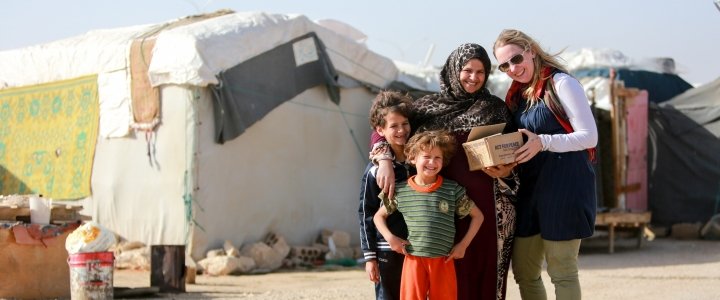Image: Lilia, her husband and three children sought refuge in Jordan after fleeing from conflict in Syria. Act for Peace partners with the Near East Council of Churches Department of Services to Palestinian Refugees (DSPR) to provide basic food and medical support and to collaborate on protection initiatives designed to train Syrian refugee women address violence and discrimination in the community. Image credit Mitchel Loveday/Act for Peace
In this blog, Janet Cousens, CEO for Act for Peace, discusses their dynamic and diverse partnerships – how they manage them, and the benefits that flow to their in-country partners. The ACFID Code of Conduct, through its focus on Quality Principle 5 (Collaboration), emphasises mutual respect, transparency and understanding in the formation of all partnerships.
I strongly believe that collaboration delivers better outcomes for the communities we serve. Collaboration also provides a model for the world we want to see – people working together creating positive change.
CULTURE OF COLLABORATION
Collaboration works best when it’s embedded in culture. At Act For Peace, we’ve adopted collaboration as a core competency for staff. We affirm that each of us is of equal value, we strive to be inclusive, to focus on understanding the perspectives, strengths, and needs of others and to learn from and incorporate the contributions and commitments of our colleagues.
This priority is reflected in the approach we take to partnerships. Our partners are phenomenal organisations with a passion to see their community thrive. We see them as leaders of change within their own communities. They have established leadership, understand their culture, and long-term commitments to community. They have their own significant skills, knowledge and resources – our role is to supplement their skills, knowledge and resources where required.
COLLABORATION IS DYNAMIC
We continually review our relationship with our partners; this involves listening, talking and learning and engaging through processes such as preparing our ‘partner plans’. These plans look different for each partner – they outline each party’s contributions to the joint outcomes we’ve agreed, and are updated over time. The plan may include a mix of capacity building goals, funding, addressing compliance requirements, joint advocacy or our conducting advocacy on behalf of the partner in circumstances where it is not safe for them to advocate, or where we have access to channels of influence not yet available to them.
FORMING NETWORKS TO ELEVATE VOICES
We also collaborate with a wide number of consortia and networks. It’s not always easy, and collaboration takes time. Sometimes it means changing our plans, which is okay if we can see that we can achieve a better outcome by working together than we could achieve on our own.
A great example is of collaboration is our engagement with the Asia Pacific Refugee Rights Network (APRRN). Act for Peace became a founding member of APRRN in 2008, recognising we were in a good position with our existing engagement with the UN to help mobilise civil society actors across Asia Pacific and strengthen their access to global decision making forums on refugees and displacement.
As a result of collaboration APRRN’s members now have strong engagement with UN forums, for example in the development of the UN’s Global Compacts on Refugees and Migration. UNHCR and others have reached out to the APRRN network, which now includes over 200 local members, to collaborate on COVID-19 prevention and response activities.
STREAMLINING THROUGH ALLIANCES
Alliances are another way of streamlining processes and getting help to those who need it much faster. A great example of this is the ACT Alliance – the largest coalition of protestant and orthodox agencies in the world, mobilising USD$3B per year for humanitarian and development initiatives. By collaborating with Alliance members, we’re able to activate funding and technical resources for disaster response through a coordinated appeal system. This way, our partner’s only need to write one proposal and one set of reports for all Alliance members, saving crucial time and resources.
SHARING KNOWLEDGE AND RESOURCES WITH OUR PEERS
The Church Agency Network Disaster Operations (CAN DO) is a local consortia made up of eight of the 12 Australian Church Agency Network members. We collaborate and coordinate in disaster management to enhance community resilience to disasters and conflict.
CAN DO has principles that guide our collaboration, along with a governance structure, risk management procedures, jointly owned policies, and a future roadmap. We work together on progressing program effectiveness, collaborate around implementation of safeguarding requirements, and more.
In our initial few years, we spent a lot of time building trust, and working out what it means to put the work of the consortia first whilst not losing our individual identities and agency needs. We’ve learnt how to share resources, map operational guidelines, and decide which of our partners would lead an emergency response.
The fruit is that as consortia we’re able to jointly access funds, share professional development opportunities, and combine resources to enhance outcomes for partners and communities.
Most importantly, our partners and their communities are benefiting. With partners we run in-country workshops to facilitate joint program design and to reflect on emergency response activations, increasingly with partners in the lead. Resourcing has increased. And we also have a specific role in interpreting compliance and grant requirements for partners so that funding is accessible.
COMMITTING TO SOMETHING BIGGER THAN OURSELVES
Achieving our vision is only possible because our staff are committed to the joys and struggles of collaborating, enabling us to create better outcomes for communities than we could achieve on our own.

Janet Cousens
Janet is the CEO of Act for Peace, the international aid agency of the National Council of Churches in Australia. With 20 years’ experience in the public and for-purpose sector, in policy, program design and management, Janet is passionate about seeing civil society thrive, and seeing individuals grow, learn and share and therefore be afforded an appropriate role in seeing their communities change. Act for Peace partners primarily and historically with local agencies with a similar vision of bringing people together to increase safety, justice and dignity for communities threatened by conflict and disaster.









